
On 11th January, 2008, the honourable Commissioner of Police, Lagos State, Mr. M.D. Abubakar granted the Squib a seventy minute long interview. The interview which took place in the Commissioner’s office showed an ebullient, forthright and a rather intellectually disposed cop in the officer. He spoke on his long career in the Nigeria Police which started in 1979 and discussed his organization passionately vis-a-vis society and government amongst other things.
A widely traveled man, Commissioner of Police Abubakar at the end of the interview did not appear to the Squib as one of the run of the mill senior police officers. This magazine wishes him the very best in his latest assignment in the Nigerian Police. Please read on. Below are the excerpts.
SQUIB: Good evening sir,
C.P: You are welcome.
SQUIB: Sir, you are the latest Commissioner of Police for Lagos State. Can we know a little about you?
C.P: MD Abubabar is my name. Born 15th May, 1960. Studied Criminology and Criminal Justice Administration {Masters Level} at the University of Lagos. I did Marketing. I did Public Administration. I did Political Science long time ago.
SQUIB (cuts in): As an undergraduate?
C.P: Yes. I’m from Gusau, Zamfara State. That’s my town. I de-emphasize the state where I come from because I believe in the unity of Nigeria. I am a member of the National Institute of Policy and Strategic Studies [NIPSS] Kuru, Jos. I am a fellow of the Nigerian Chartered Institute of Economics. So, because I believe in the unity of Nigeria, that’s why I usually say I don’t have a state. I think Nigerians should work hard and co-operate so that we will look like other countries of the world.
SQUIB: Before you became the Commissioner of Police Lagos State, what was your career path like?
C.P: Well, you see emm… after I passed out, I worked briefly in the State CID at Markudi, that was my first location. After one year; I went to Scotland Yard in England.
SQUIB: When was that?
C.P: In 1982. I was privileged to go to the Metropolitan Police College in England and the Malaysian Police College where I did the MPF training (Mobile Police Force) in 1983. I was in Kebbi before I moved on to the Intelligence Department, we call it CIB (Criminal Intelligence Bureau). While at the CIB, I went to a Polytechnic in Cairo in 1986. I attended courses in Welshfield and Yorkshire in England. Then I went to Israel Command Force in 1996. I equally have a Diploma in International Business Management, also from Israel. I went to the Federal Bureau of Investigation [FBI] Department in United States. Then from there, I was growing through the career.
In 1991, I went for an international security course in England that took me to eleven countries of the world. When I came back, I was posted to the rank of an Assistant Commissioner of Police, CID in Sokoto. I attended my regular police training at the Police Staff College; A-course, B-course, Intermediate Command Course and Command Course at different intervals. Then in 1993, I came back to Lagos. I was an Assistant Commissioner of Police in charge of Federal Operations, Force Headquarters, Kam Salem House. From there, I was posted to the Murtala Mohammed International Airport (MMA) Ikeja as Airport Commander also in 1993. By virtue of my position as Airport Commander, I had the opportunity of traveling to most airports of the world to do Security understudy in terms of the security of the airports. Then, I became the Deputy Commissioner of Police at the airport.
I was promoted in the year 2000 and was transferred to Plateau State as Commissioner of Police. I was CP Plateau, Abia, Kwara and Kano States. I came back and became CP, MMA Airport again because when I was at the airport, I was writing proposals that the airport should be upgraded to a level of a command in view of the nature of what I saw and taken into consideration acts of terrorism, normally a threat to most airports of the world. I can say I am glad and very grateful to the almighty God for being with us. Some of my colleagues don’t have the opportunities to do that.
I can say without doubt, I have commanded the most populous states in Nigeria (Lagos and Kano). Lagos and Kano are the most problematic, most difficult and most challenging states in Nigeria.
SQUIB: How do you mean most populous, most difficult?
C.P: Lagos and Kano are the most populous states in the country; most challenging, most problematic and most complex. You know when I say most challenging, it is in the sense that population is a determining factor that has to do with crime. Because in the area of unemployment and high level of poverty, you know what that means to the society. So you have the contending role of ensuring that those who are not employed do not infringe on other people’s rights by taking their properties, harassing or molesting them.
Let us take for example the issue of traffic, the volume (both human and vehicular) in Lagos and Kano. I think these two states can share the highest volume. Today, Kano has 44 Local Government Areas even after Jigawa State was carved out of it. From one LGA to another, you can spend up to 4 hours to drive there! So big.
Any day, Monday through Friday, you will be wondering where the human beings are coming from. One of my friends once said whether they are being dropped from upstairs. Because, the kind of the situation in Kano is the same with that of Lagos. And I say challenging because you can see the challenges you have in Lagos. Area boys scourge alone is a problem. For you to be able to tackle the problem of area boys, for them not to harass, molest anybody and you want them to go and sit down doing nothing when they have no food to eat and have no shelter, is really a challenging one. And they (Lagos and Kano) are equally commanded by the largest number of police force in terms of personnel. I am having about 28,000 policemen (officers and men) in Lagos State and there is no other state you can compare with Lagos.
If you look at the policemen, for me to be able to control them, let alone talk of the 17 million people that are in Lagos State. It’s a very challenging task. It’s not the Lagos State that we used to know in the ‘70s. Look at the expansion of Lagos. Take for example, a drive just from old Maroko towards Epe. Left, right and center, you have hundreds of estates coming up from this axis. Some people, if you ask them about the location of Langbasa in Lagos State, they don’t know where Langbasa is. You come back to look at places like Igando. Igando used to be a very remote, bushy area that you find nobody but now it’s a city densely populated.
SQUIB: How do you cope? How does the command cope under you?
C.P: Well, that’s why I say it is very challenging. It is not an easy thing. We thank God for giving us the ability and capability to put up our best. But we leave the rest to the people to decide whether what we are doing is right. We are only doing everything humanly possible to do our best because when I took over the mantle of leadership of the Lagos State Police Command in June 2007, having known what the command is, and having spent many years of my career here, I know what Lagos is all about and the knitty-gritty of fighting crime and vis-a-vis the fighting tools we have. They are there but not adequate enough when and where you want them. Happily, we have seen a government that is responsible enough to respond to the yearnings of the people. Mr. President is doing wonderfully well. I can’t say otherwise.
SQUIB: What about the State Government?
C.P: The State government is doing very well also in terms of providing adequate equipment. You see, when you have individuals driven with passion for safety of lives and properties, then they are committed and that’s the only way you can describe the Governor of Lagos State.
And being a lawyer, he has no option than to do well. I think being a lawyer, there is no option than to do what he is doing. He is an individual beside being a lawyer who has love for his people otherwise he wouldn’t do what he is doing and I think there is no state in this country that has done what he has done so far.
SQUIB : How do you mean?
C.P: All along, he went to convince and got the support of corporate bodies and individuals to put up like 250 vehicles at a go, costing over several millions of naira. I don’t know of any state that has done this. I stand to be corrected, Governor Babatunde Raji Fashola is doing great, perhaps others will follow in this direction. Police is an agency of the government. It is not a partner in that government. Whether it is a state or federal government, it is their responsibility to provide the tools for the police to use. That’s why you hear police are not being well paid, the police are not doing this or that.
The first important thing is what have they got to perform that function? For example, you can’t take a child to school without books, without writing materials and you expect him to write and you expect him to read without textbooks and also expect him to pass his/her exams. It is practically impossible. So, we are making do with what we have and this is the first time you can see they are responding to the situation of the people. More arms and ammunitions are being bought. If you look at the challenges, he (IGP) knows where the shoe pinches. The IGP knows where it pinches and he took up the challenges and we are quite happy with what is happening and he has taken the welfare of the Nigeria Police seriously.
SQUIB: Are you saying, the Police are now being well remunerated/better paid?
C.P: Security is very expensive these days. Nobody can quantify the level of security and ever pay you adequately for what you have done. I stand to be corrected. But you pay somebody a living wage, something that will make him cater for his family, pay school fees, take care of his children, feed his household and live comfortably. But if you want to quantify what he has done and you want to pay him, it is practically impossible. Mathematically, you can’t do that!
SQUIB: Can we say the Police are now having a living wage?
C.P: We are transcending to something close to that.
SQUIB: If I may ask you, sir, the average Nigerian sees the police as being not his friend, as somebody, to be feared. They see the police as a bully, somebody who should not be assisted because if you help the police, you are in trouble or could be in trouble.
C.P: I think it is not true and would be frank with you. One of the reasons for this perception is:
{a} Probably, you had an encounter with the wrong policeman.
{b} Nigerians are very gullible persons and like breaking the laws and want to go scot free. An example is driving against one way and a policeman stops you, then you say I am Mr. so and so. Then the policeman says you are going to the station. The policeman is strictly doing his job.
{c} Another typical example is that most Nigerians encourage policemen to do some of the bad things they practice. The government has the responsibility of building police stations and giving all the necessary equipment to the police to work. But this does not happen. Then therefore, say for an instance, there is a DPO and somebody from nowhere walks to a police station, introduces himself under the banner that he wants to assist the police asking why the police station is like this? Why are there not enough facilities and equipment? Then he dips his hands into his pocket and brings out two to three hundred thousand naira and gives the DPO. The DPO will be very happy or he gives the DPO the money to buy files for the police station. The DPO collects the money.
About three days later, the same person walks to the DPO. The DPO will even prostrate to the man to appreciate his kind gestures. The man then tables his problem before the DPO that he has a brother or somebody in the DPO’s custody and he tells the DPO that he knows his brother and that his brother can’t do such a thing as he was being accused of. Perhaps, his brother has committed robbery and the police do not have evidence to prove such a case. Based on his earlier humanitarian gesture, the DPO releases the criminal brother to continue robbing. The DPO has been lured to do what he did. If the government gives all that is required, you won’t have that happening.
An ideal police station should have 8 vehicles but a situation where there is only one vehicle to a police station and there happens to be 2 distress calls almost at the same time, which one should the police attend to? Whose fault? The same thing applies to a fire brigade fighter. There is a fire outbreak and when he gets there he opens the nozzle but there is no water. A distress call comes to a police station and the policemen say there is no vehicle, then the caller bangs the phone saying old story again. His expectation is that the police should be adequately equipped 24 hours to come to his aid. Nonetheless, the police is trying its best in the circumstances. I stand to be corrected, it is only the Nigerian Police that fights corruption in this country, the way corruption should be fought!
SQUIB: How?
CP: It is only the Nigerian Police that arrests its own personnel for wrongdoing. If he is arrested, he is detained. He is investigated, and if found guilty, is dismissed and prosecuted. Is there any other organisation like the Nigeria Police that fights corruption?
Sometimes in this country, people were being shot for carrying cocaine. Did they stop? They never stopped. People are being shot for armed robbery, it is still goes on. You and I know clearly, it is part and parcel of the society. Once society exists, crime must exist no matter how small it is. And we are not going to be tired; but I tell you that there has been serious reduction in forms of bribery and corruption in this command, and even with the coming of the Inspector General of Police (IGP), there has been serious reduction in crime and you can see the level of change in our policemen in terms of their behaviour and character while on the road. Because once they realize that the leadership does not tolerate it, they run away. It is a leadership problem. Once you have leaders who say; No, I don’t want this or that, you have to do what is right otherwise, you will be shown the way out. They will perform excellently well.
SQUIB: Can you tell us what the relationship between your command and the military is?
CP: Well, so far so good, we have an excellent relationship in this command with the military, we exchange ideas and relate very well. We interact very well. We go for meetings where we sit down together. We have never had any problems.
SQUIB: Have you heard if their personnel have ever beaten up your men?
CP: Since I came, I have not had that experience, not even once. We have had instances of the military handing over men involved in criminal activities over to me.
SQUIB: By themselves?
CP: Yes. So, that is to tell you the level of cooperation we have. It is excellent. For now, it is excellent. We have never had any cause to break that cordial relationship. I know the Brigade Commander, Gen. Maitama Yussuf, a very fine officer. The Airport Commander is excellent. Also, the Naval Commander. We have excellent officers’ relationship. Look at the issue of the merchant navy, we just took over the merchant navy and they handed over the case to us because they know their limitations. Cooperation we should have. And it goes well. And we have meetings we go to, sit down, exchange ideas, and do things together. That’s how it should be.
SQUIB: What about this problem of hospitals (doctors) getting clearance from the police before they can treat patients with gunshot wounds?
C.P: You mean you have to first and foremost get a clearance from the police before you can be treated? It has changed completely because we don’t have such problems now. Most of the time, people go to the hospitals before police stations. They are treated without the police even if the person is an armed robber. The first thing you can do is to treat him first because we don’t want him to die. We want him to sit down and give us information about who he had killed, where he killed and where the arms and ammunitions were. Things have changed. We don’t have problems with that at all.
SQUIB: Sir, Police and lawyers, it’s like a cat-dog relationship? What is the problem? Sometimes, policemen maybe hostile to them and your policemen see lawyers as being arrogant. Sometimes lawyers come to the police station to seek bail for their clients, but you hear policemen tell the clients, “instead of settling the case you have money to hire a lawyer, who told you to bring a lawyer and lots of things like that.” As an experienced police officer, how do you see these issues and what advice do you have for the lawyers?
C.P: I think it all depends on the level we relate. What matter is the understanding of ourselves knowing the role of the lawyer and what he is supposed to do. Some policemen don’t know. Some do and some are not worried at all. I have interacted with the NBA in Lagos State. Since I came to this state, we have exchanged ideas. For us to have proper co-ordination, I appointed a liaison officer so that he will be able to relate with Nigerians. I took it as a point of duty to lecture all my DPOs and Assistant Commissioners to ensure that what we do is right. Tell them what to do and how we expect them to behave at all times. Everyone has the right to come and see anybody that is detained at the police station, that’s the provision of the law. The investigating police officer (IPO) can be there. If it is within the police powers to grant bail at the police station and if it is a bail-able offence, it will be so granted provided it will not jeorpardise further investigation.
Lawyers are supposed to be working with the police and the judiciary. The police see to it that justice is done. Some lawyers understand. For instance, if somebody or a client comes to you (lawyers) to tell you a story of land matters, landlords and tenants issue, instead of you (lawyers) to take the case to court and charge him your professional fees and do what is right. You will rather want to use the police. This is unacceptable and we need to do more. We have responsibility to do more. If the lawyers and police work together, it is for the benefit of the citizens of the country.
One, you have left trivial and minor cases out of court. Two, you have left civil matters, all these civil cases (landlord and tenant) out of police stations. You have not paid the landlord your house rent as a tenant and you are rushing to the police for help. Or the landlord has locked your room because you are owing. These are cases that can be resolved ordinarily without going to court so that our courts can be left free to face serious cases. Lawyers are supposed to be crisis and conflict resolution managers just like the police. A lawyer can act as a policeman by his powers under the law, he can also make arrests just like any other person. By the wisdom God has given him as a professional, he should be able to sit down and advise his clients to follow the law and do the right thing. Some of these cases are very minor.
You see neighbours fighting over very trivial issues. You should separate them, because even if you go to court, and send the guilty person to jail, the person (offender) will still come back and live with the person who took the case to court, in the same house and probably go back to the same problem. Why don’t you make peace, because it doesn’t pay anybody to cause trouble. After paying the lawyer whatever he will charge, you are still going back to that same house.
SQUIB: If I may ask you, sir, MD Abubakar, why did you choose to be a policeman?
C.P: I think I have answered this question over and over again. I think I am destined to be a policeman by God. Do you believe in destiny? Yes, I do. Yes, I do because it is wherever you find yourself, you adapt. If I am not a policeman, I wonder where I would have found myself. That’s why I said I am destined to be a policeman. And I am proud of the Nigerian Police. Most people are criticising the police because they do not know the police. You and I know that several people don’t know what the police work is all about. What is the police salary? What and what it takes to be a policeman? How long it takes? What are the duties? What trouble does he go through?
There is need for you to appreciate a man’s job for you to be able to say whether he is doing the right thing or not. And for some people, the police is bad for the fact that the police do not allow themselves to be used by them. Tell me in this country, who doesn’t use the police either for good or bad?
SQUIB: Under your command, can the people use you?
C.P: Yes, legally, for good. Surely. But nobody can use me for evil. If you are doing what is wrong, you have to bear the consequences of your action. And there is a level you will be in the service, you just have to do what is right.
SQUIB: Are you saying if the Inspector General of Police (IGP) says you should do something that is wrong, you won’t do it?
C.P: My IGP will not tell me to do what is wrong. Sir Mike Okiro will not give me an instruction to do what is wrong.
SQUIB: He is a superior police officer, how can you tell your superior officer that you can’t carry out an order?
C.P: You can. Let me tell you, I have Area Commanders and Divisional Police Officers (DPOs).
SQUIB: Can they say No to you?
CP: Obviously, yes because I won’t give them bad instructions. They don’t work in my farm. The instructions I give will be legal instructions to do police duties. I will not tell them to release an armed robber without carrying out investigation. You can ask my DPOs whether I write such notes to them. If I write to any DPO, it is to say “Dear DPO, ensure justice is done.” I don’t give orders to do this or do that.
SQUIB: Sir, since the EFCC, am sorry to say, seem not to have a head for now, will you mind going their to head it?
CP: Don’t ask me about that. Well, I don’ want to go into that.
SQUIB: Nice to be with you sir.
CP: It is my pleasure. You are welcome.
































































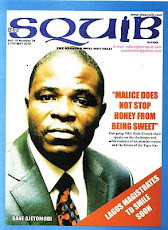

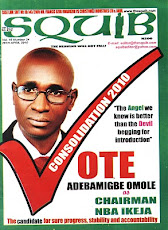
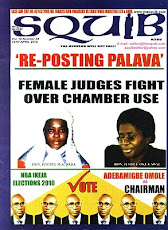
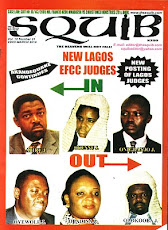
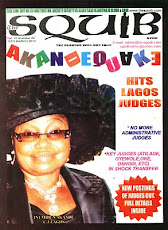


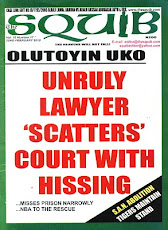
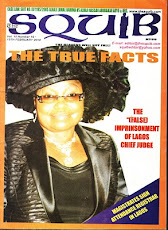
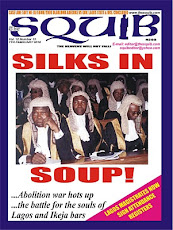


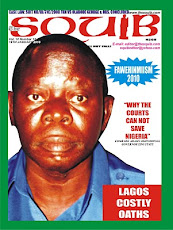
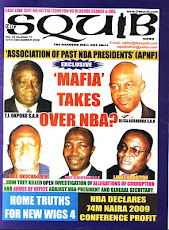
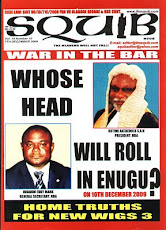

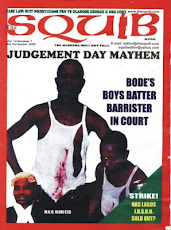


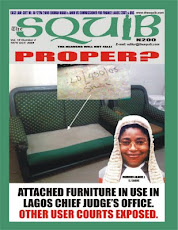





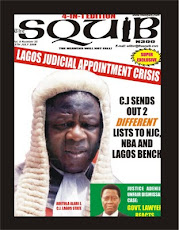
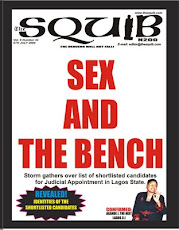


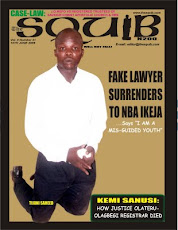
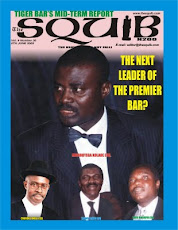
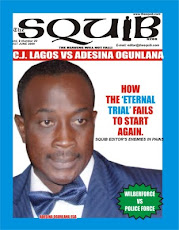
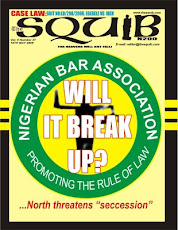
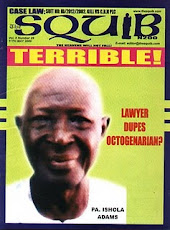




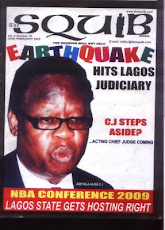
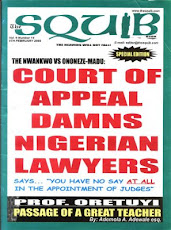








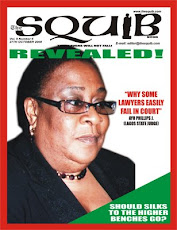

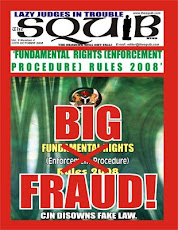
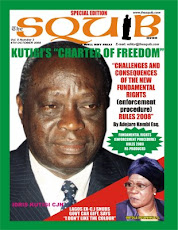
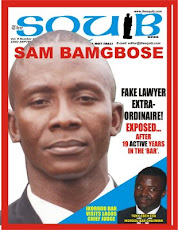


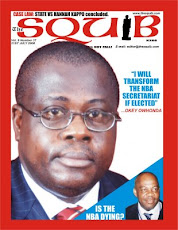
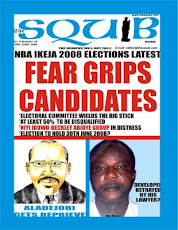
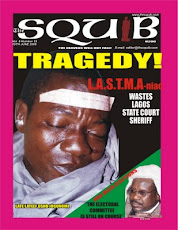
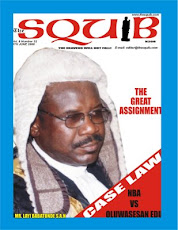
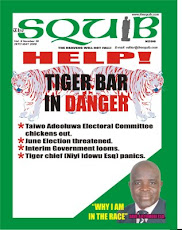


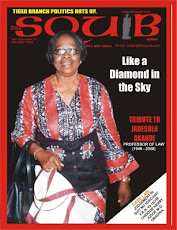
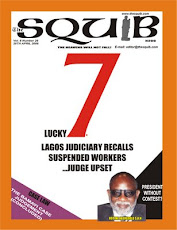

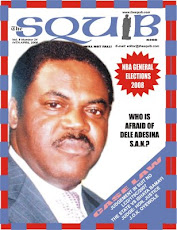

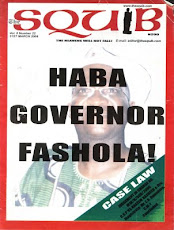
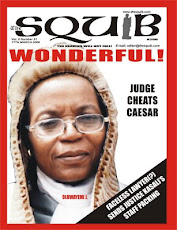
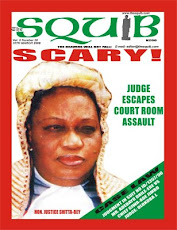


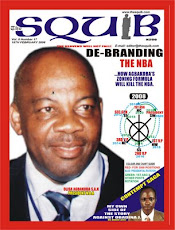

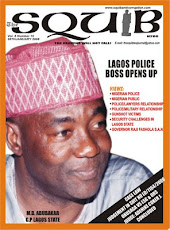
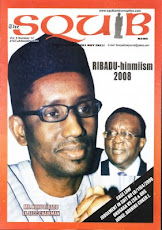
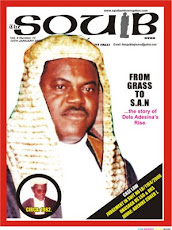









No comments:
Post a Comment